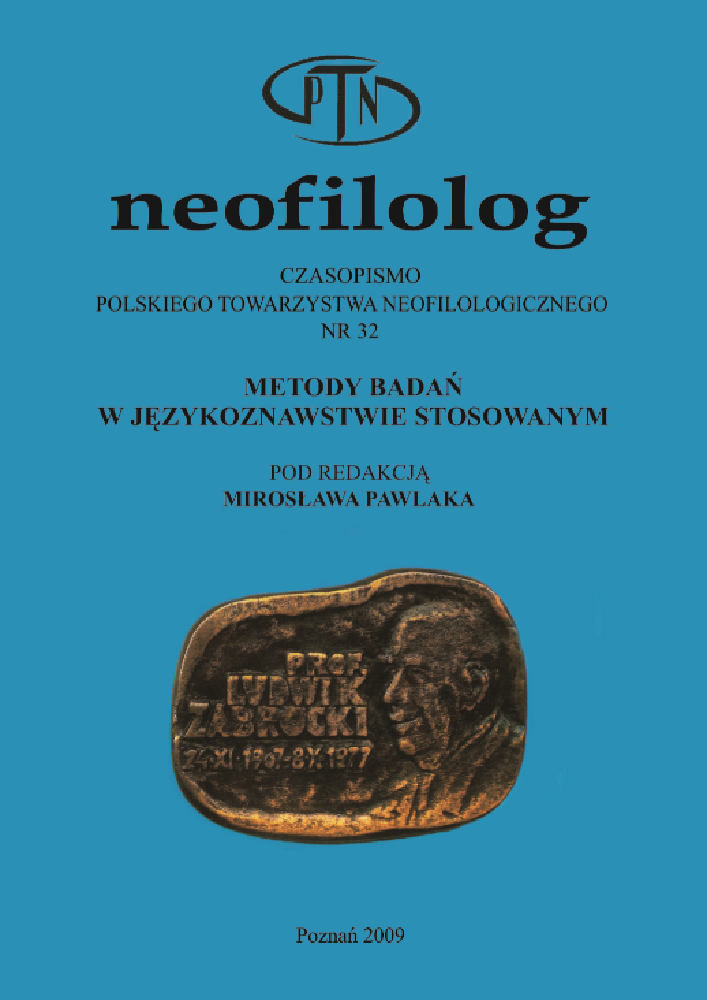Abstract
The present study focuses on the use of learner diaries as an empirical tool. We discuss the pros and cons of this approach. Diary studies are classified as methods in exploratory-interpretive research. Diaries can help investigate language learner behaviors, encourage student self-assessment and explore how the language learning processes progress. The most problematic methodological aspects are the following: data collection, limitations of learners’ reflections and limited generabilizity.
References
Aguado, K. i Riemer, C. 2001a. „Triangulation: Chancen und Grenzen methodischer empirischer Forschung”, w: Aguado, K. i Riemer, C. (red.). 2001. 245-257.
Aguado, K. i Riemer, C. (red.). 2001b. Wege und Ziele. Zur Theorie, Empirie und Praxis des Deutschen als Fremdsprache (und anderer Fremdsprachen). Festschrift für Gert Henrici zum 60. Geburtstag. Baltmansweiler: Schneider Verlag Hohengehren.
Allison, D. 1998. „Investigating learners’ course diaries as explorations of language”. Language Teaching Research 1. 24-47.
Allwright, D. i Bailey, K. M. 1991. Focus on the language classroom: An introduction to classroom research for language teachers. Cambridge: Cambridge University Press.
Appel, J. 2000. Erfahrungswissen und Fremdsprachendidaktik. München: Langenscheidt-Longman.
Bailey, K. M. 1991. „Diary studies of classroom language learning: The doubting game and the believing game”, w: Sadtono, E. (red.). 1991. 60-102.
Bartnitzky, J. 2004. „Einsatz eines Lerntagebuchs in der Grundschule zur Förderung der Lern- und Leistungsmotivation. Eine Interventionsstudie”. Praca doktorska. (www.eldorado.uni-dortmund.de)
Borg, S. 2001. „The research journal: A tool for promoting and understanding researcher development”. Language Teaching Research 5. 156-177.
Edmondson, W. J. 1997. „Sprachlernbewußtheit und Motivation beim Fremdsprachenlernen”. Fremdsprachen lehren und lernen 26. 88-110.
Grotjahn, R. 1998. „Subjektive Theorien in der Fremdsprachenforschung: Methodologische Grundlagen und Perspektiven”. Fremdsprachen lehren und lernen 27. 33-59.
Grunwell, P. (red.). 1988. Applied linguistics in society. Papers from the British Association for Applied Linguistics. London: CILT/BAAL.
Halbach, A. 2000. „Finding out about students’ learning strategies by looking at their diaries: A case study”. System 28. 85-96.
Howell-Richardson, Ch. i Parkinson, B. 1988. „Learner diaries: Possibilities and pitfalls”, w: Grunwell, P. (red.). 1988. 74-79.
Kallenbach, Ch. 1996. Subjektive Theorien. Was Schüler und Schülerinnen über Fremdsprachenlernen denken. Tübingen: Narr.
Katchen, J. E. 1995. „Self-directed listening: What student journals reveal”. Online ERIC Reproduction Document Service Nr. ED 385 162.
Krieger-Knieja, J. i Paprocka-Piotrowska, U. (red.). 2006. Komunikacja językowa w społeczeństwie informacyjnym. Nowe wyzwania dla dydaktyki języków obcych. Lublin: Towarzystwo Naukowe KUL.
Krishnan, L. A. i Hoon, L. H. 2002. „Diaries: Listening to ‘voices’ from the multicultural classroom”. ELT Journal 56. 227-239.
Krumm, H. -J. i Portmann-Tselikas, P. R. (red.). 2003. Theorie und Praxis – Österreichische Beiträge zu Deutsch als Fremdsprache. Innsbruck i in.: Studien Verlag.
Langner, M. 2006. „Dokumente zur Sprachlernberatung. Zur Vorentlastung in Sprach(lern)projekten”. Zeitschrift für Interkulturellen Fremdsprachenunterricht 11. (www.zif.spz.tu-darmstadt.de).
Maxwell, J. 1996. Qualitative research design: an interactive approach. Thousand Oaks, CA: Sage.
Nerlicki, K. 2007. „Ewaluacja osobistych procesów uczeniowych za pomocą dzienniczków”, w: Pawlak, M. i Fisiak, J. (red.). 2007. 211-226.
Nerlicki, K. 2008. „Dzienniczki i ich rola we wspieraniu świadomości uczeniowej i komunikacyjnej studentów neofilologii – studium przypadku”. Przegląd Glottodydaktyczny 25. 143-161.
Nęcka, E., Orzechowski, J. i Szymura, B. 2006. Psychologia poznawcza. Warszawa: Wydawnictwo Naukowe PWN.
Parkinson, B., Benson, C. i Jenkins, M. 2003. „Learner diary research with Cambridge examination candidates”. Edinburgh Working Papers in Applied Linguistics 12. 45-63.
Pawlak, M. i Fisiak, J. (red.). 2007. Dokumenty Rady Europy a nauczanie języków w polskim systemie edukacji. Łódź: Wydawnictwo Wyższej Szkoły
Humanistyczno- Ekonomicznej.
Pellegrino, V. A. 1998. „Student perspectives on language learning in a study abroad context”. Frontiers: The Interdisciplinary Journal of Study Abroad 4. 91-120.
Prokop, I. i Wiśniewska, D. 2002. „Metodologia i narzędzia zastosowane w projekcie”, w: Wilczyńska, W. (red.). 2002b. 109-128.
Rubin, J. 1981. „Study of cognitive processes in second language learning”. Applied Linguistics 11. 117-131.
Seel, N. M. 1991. Weltwissen und mentale Modelle. Göttingen i in.: Hogrefe.
Sadtono, E. (red.). 1991. Language acquisition and the second/foreign language classroom.
Anthology series 28. Online ERIC Reproduction Document Service Nr. ED 367 166.
Suzuki, R. 2004. „Diaries as introspective research tools; From Ashton-Warner to blogs”. TESL-EJ 8. (www.tesl-ej.org).
Trad, A. R. 2006. „Subjektive Theorien der Lernenden zur Optimierung des Lernerfolgs”. Neofilolog 28. 78-84.
Wilczyńska, W. 2002a. „Podmiotowość i autonomia jako wyznaczniki osobistej kompetencji komunikacyjnej”, w: Wilczyńska, W. (red.). 2002b. 51-67.
Wilczyńska, W. (red.). 2002b. Autonomizacja w dydaktyce języków obcych. Doskonalenie się w komunikacji ustnej. Poznań: Wydawnictwo Naukowe UAM.
Wildmann, D. i Fritz, Th. 2003. „Und jetzt wird reflektiert... Reflexionstagebücher in der Aus- und Weiterbildung”, w: Krumm, H.-J. i Portmann-Tselikas, P. R. (red.). 2003. 41-51.
Wiśniewska, D. 2006. „Student neofilologii jako współuczestnik badania w działaniu“, w: Krieger-Knieja, J. i Paprocka-Piotrowska, U. (red.). 2006. 173-182.
License
Copyright (c) 2009 Krzysztof Nerlicki

This work is licensed under a Creative Commons Attribution-NoDerivatives 4.0 International License.
Authors
Authors of texts accepted for publication in Neofilolog are required to complete, sign and return to the Editorial team’s office the Agreement for granting a royalty-free license to works with a commitment to grant a CC sub-license.
Under the agreement, the authors of the texts published in Neofilolog grant Adam Mickiewicz University in Poznań a non-exclusive, royalty-free license and authorize the use of Attribution-NoDerivatives 4.0 International (CC BY-ND 4.0) Creative Commons sub-license.
The authors retain the right to the free disposal of the work.
Users
Interested Internet users are entitled to use works that have been published in Neofilolog since 2017, under the following conditions:
▪ attribution – obligation to provide, together with the distributed work, information about the authorship, title, source (link to the original work, DOI) and the license itself.
▪ no derivatives – the work must be preserved in its original form. Without the author's consent, it is not possible to distribute the modified work in the form of translations, publications, etc.
Copyrights are reserved for all texts published since 2017.
Miscellaneous
Adam Mickiewicz University in Poznań retains the property right as a whole (layout, graphic form, title, cover design, logo etc.).
